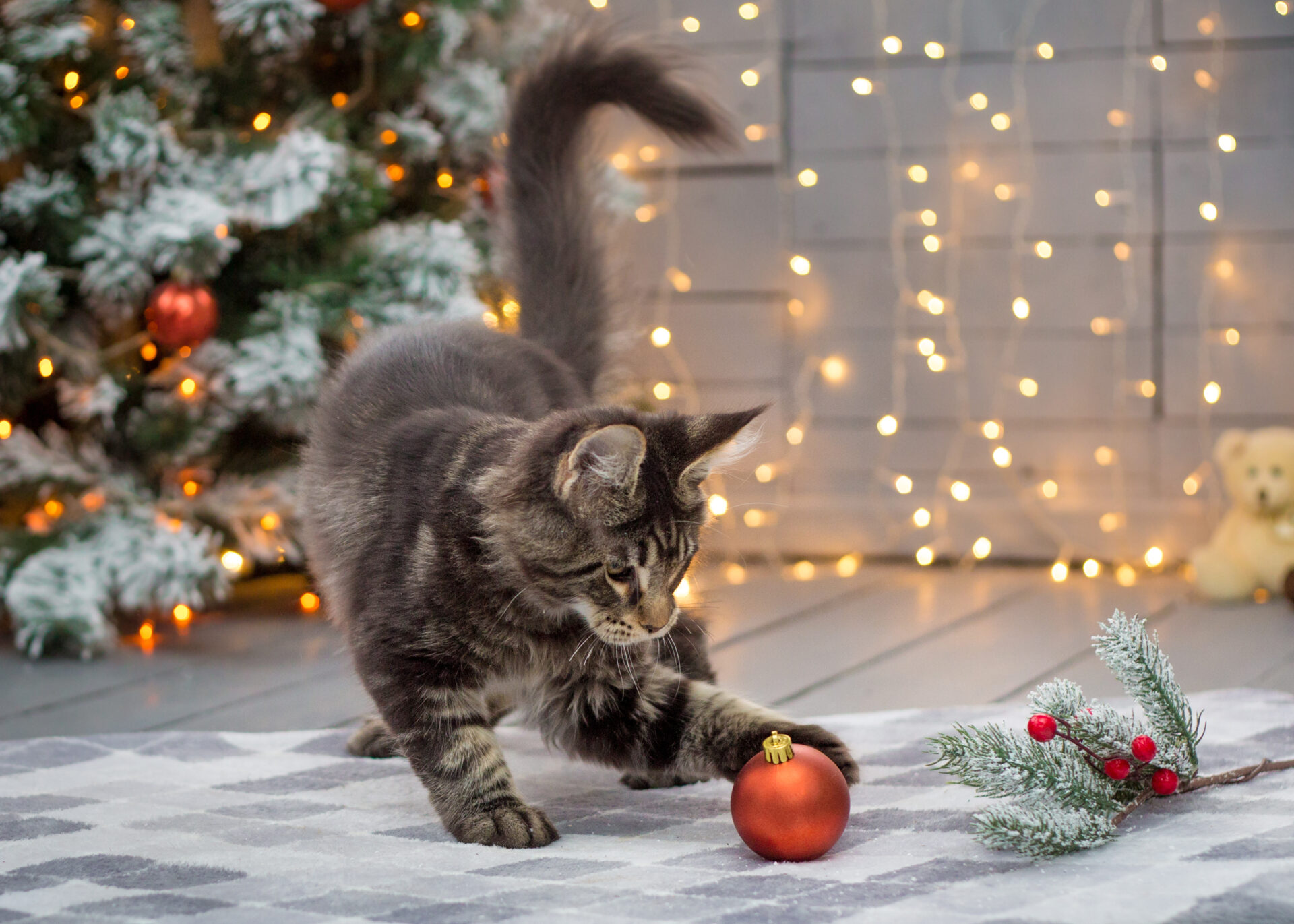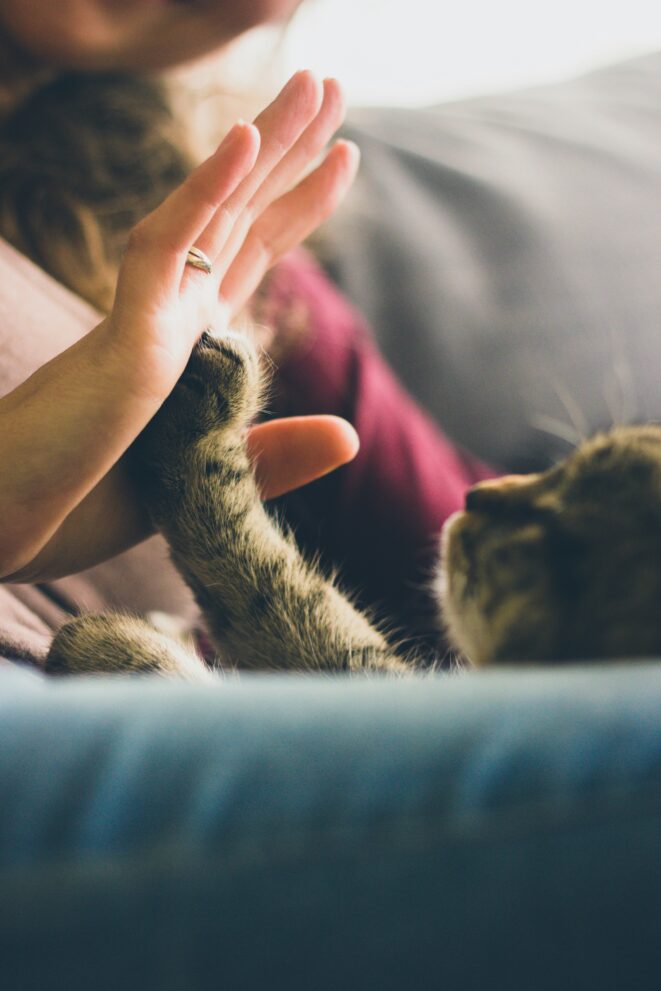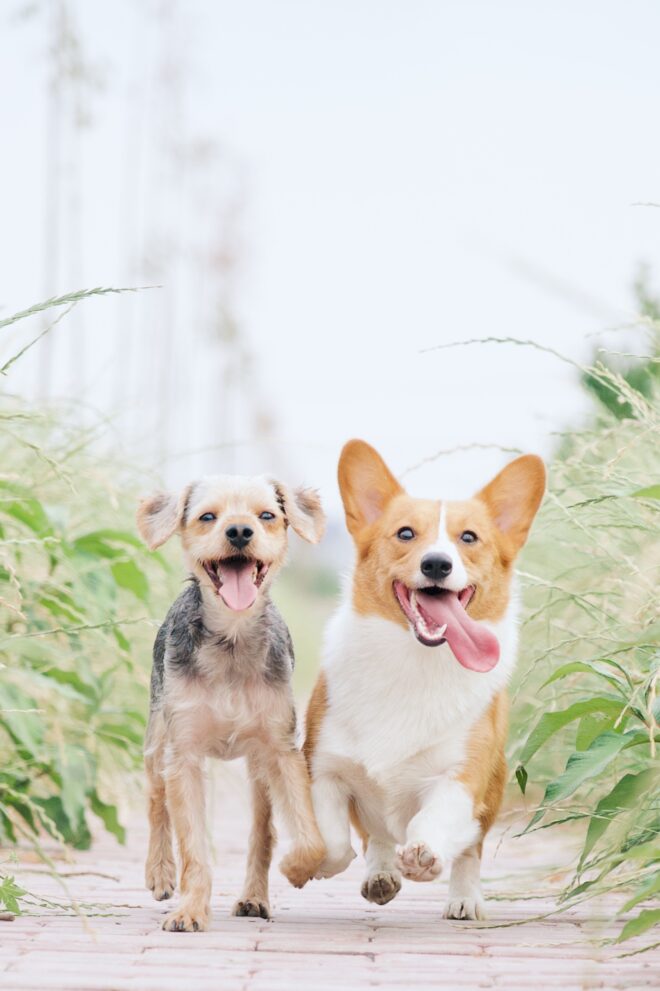The festive season should be a time for joy, indulgence and celebration – and we all like our pets to enjoy their holiday fun too! It’s wonderful to be able to include our pets in the festive spirit, but it’s important to keep them safe, too. At Christmas, our homes can be very different from normal – visitors, decorations, food and more, and not all of these are suitable for our furry companions. Keeping festivities safe for pets means that everyone can have a relaxing holiday season.
Food
Everyone loves a little treat at Christmas, and we all like to spoil our pets a little too. Giving a treat or two is fine, but care must be taken that only safe foods are given. Many human festive foods are unsuitable for pets, and may even be toxic.
What NOT to Give Pets
Here are some traditional Christmas foods to keep safely away from pets this Christmas. Remember that many animals are curious (I’m looking at you, cats!) and highly attracted by new scents, so keep unsuitable foodstuffs secured away rather than out on a table or kitchen side.
- Overindulgence – a common Christmas problem for us humans, but pets can also overdo things a little. Tummy upsets are common around this time of year, so keep treats sensible.
- Christmas cake, Christmas pudding and mince pies – these all contain dried fruit, which can cause acute kidney failure in cats and dogs. This is thought to be due to tartaric acid present in variable amounts in grapes, which is why some pets seem able to “get away with it”, but the safest choice by fair is to avoid letting your pets access grapes or any dried version such as raisins, currants and sultanas.
- Chocolate – theobromine, the active ingredient in chocolate, is highly toxic to pets. Symptoms include hyperactivity, tremors, vomiting and diarrhoea and seizures. Even small amounts, especially dark chocolate, can lead to a fatal liver failure.
- Onions – all members of the Allium family such as leeks and onions can cause a fatal anaemia in cats. Onions are often found in dishes such as stuffing, but may not be obvious. Small amounts can cause gastric upsets in other animals.
- Sweeteners – many products now contain artificial sweeteners, including chewing gum, sweets and toothpastes. If dogs eat these, the xylitol sweetener can have a toxic effect, by causing a huge release of insulin leading to hypoglycaemia. Symptoms include lethargy, collapse and seizures.
Safe Alternatives
We all want our pets to enjoy the festive season, of course, and to have a little treat now and again! There are plenty of excellent alternatives that don’t involve your dog snaffling a mince pie, or the cat investigating the box of posh chocs. Small amounts of lean turkey are a good choice for cats and dogs, and small pets such as guinea pigs or rabbits may appreciate a small offering of tasty greens. Or why not check out some specially designed, tasty and safe treats for dogs, cats or rabbits?
Decorations
Adorning our houses with festive ornaments is a lot of fun, but we must ensure that our pets’ environment is safe for them.
Be Careful Of…
A whole host of new things being brought out into the house may just make your pets think they have some lovely new toys to play with! However, some Christmas decorations are definitely not appropriate as toys.
- Tinsel – long, shiny, crinkly tinsel will look very much like a new cat toy to your feline friends. If swallowed, tinsel can cause choking or a gastrointestinal obstruction. Keep this common decoration secured out of reach of pets.
- Baubles – glass baubles can easily shatter, leaving dangerous glass shards. Plastic baubles are safer around pets.
- Lights – especially attractive to cats, tree- and Christmas lights can entangle pets who try to investigate them, or cause burns and electric shocks. Keep cables taped securely out of harm’s way, and turn lights off when not actively supervised.
- Candles – hot wax can burn investigating noses, and an inquisitive paw or wagging tail can easily knock over a lit candle, leading to a fire hazard. Candles and pets should always be supervised, and preventing access entirely is recommended.
- Batteries – some decorations and toys require batteries. These should be kept well out of reach to pets, as they can be very dangerous if ingested.
Why Not Consider…
If you’re concerned that your pet may fancy a play with your Christmas decorations, why not invest in some new toys for them instead? Perhaps Santa could visit early with a perfect pressie for your cat or dog. Indulging in some active play with your pet is the perfect way to spread some Christmas cheer – and to tire them out enough to prevent mischief!
Plants and Trees
Bringing greenery into the home is a popular pastime in the winter holidays.
Be Aware of these Greens
There are some plants that are more problematic for pets than others.
- Christmas tree – a staple for many houses at this time of year, but they can be irresistible to pets trying to climb them. Real trees drop needles, which can irritate pets’ feet, whereas artificial trees may drop small bits of plastic or be sprayed with preservatives and fake snow, which can be toxic.
- Poinsettia – this popular festive plant can cause irritation of the mouth if chewed, leading to excess salivating and vomiting.
- Holly and mistletoe – these festive plants often have berries still attached, which can cause vomiting and diarrhoea if eaten.
- Lilies – red lilies are popular at Christmas, but should be avoided if cats are present in the household, as all parts of the lily plant are hugely toxic to cats.
Safe Alternatives
Secure greenery away from pets, and use a strong, stable base for your Christmas tree.
Visitors
Christmas is often a time for visiting family and friends, to spread seasonal cheer. Having lots of hustle and bustle in their environment can be stressful for cats, dogs and other small pets. Consider setting up a ‘safe zone’, with a cosy bed, litter tray, food and water and other resources that they can retreat to if feeling overwhelmed. If your pet is easily overwhelmed, consider a calming supplement – speak to your vet for more advice.
Christmas – Final Thoughts
Hopefully these top tips will help you have a very festive season, whilst keeping your pets safe and happy. If you think your pet has eaten something they shouldn’t have, injured themselves or are otherwise unwell, do contact your veterinary practice. There will be someone available to see you over the whole Christmas period, whether at your local surgery or a nearby emergency care provider.
Merry Christmas!





